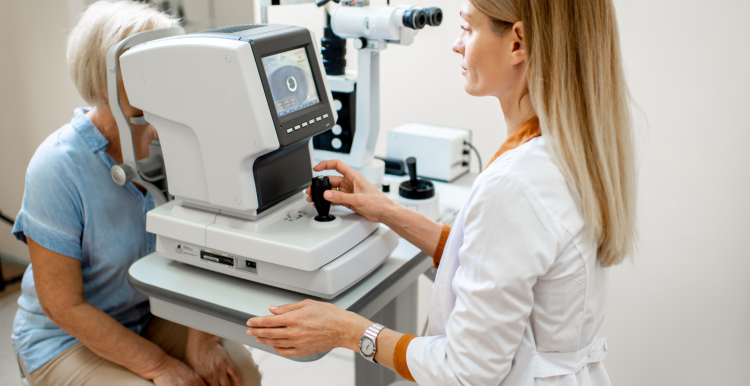Feedback from people with macular disease and sight loss

Nearly 1.5m people in the UK have macular disease. It affects people of all ages. Age-related macular degeneration (AMD) is the most common condition, generally affecting people over the age of 55.
AMD is the biggest cause of sight loss in the UK, affecting more than 700,000 people. A group of rare inherited conditions called macular dystrophies can affect much younger people. Some of these rare conditions can appear in childhood, although some are not diagnosed until later in life.
Links to helpful signposting information based on the issues raised can be found at the bottom of this page.
Key themes
- The outpatients process for getting an eye scan and injection is very efficient. People know when their follow up appointment is going to be almost immediately.
- There are support groups available to people in Gloucestershire who provide a wealth of advice and guidance, but these these are not always promoted by opticians - so people are not getting this information when it is most needed.
- In some cases, technology can be beneficial for people with sight loss. However some things, like the NHS app, are not user friendly and people are concerned about how they will be able to communicate with their GP practice in the future.
- Accessibility requirements are not always being met in terms of appointment letters, information leaflets and hospital signage.
- People want to share their views but feel be excluded from participating if they are not informed or if their communication needs are not met.
What needs to be improved
- People should be provided with the right information at the right time, as early as possible, so that people experiencing macular degeneration know what to expect and what support is out there for them in terms of peer support groups.
- GPs, hospitals and care providers should document a person’s communication needs on their medical record/care record and ensure that these are kept up to date.
- Healthcare decisions should be made in partnership between the doctor and the patient (and their carer if applicable) so people should feel empowered to ask questions and challenge decisions if they don't feel it is appropriate - 'what matters to me' conversations.
- As services are being designed, this must be done in collaboration with patients e.g. signage at the Gloucestershire Hospitals Trust eye department.
- Healthwatch Gloucestershire to produce large print leaflets on black and yellow contrasting paper which includes ways to share feedback.
Downloads
Signposting information
Macular Society
- 0300 3030 111
- https:/www.macularsociety.org/
Insight Gloucestershire
- 01242 221 170
- Whether you’re adjusting to changes in your vision or have lived with sight loss for years, Insight Gloucestershire can help with information, advice and a wide range of services to help you stay independent, active and enjoying what matters to you.
- https://www.sightsupportwest.org.uk/insightglos/
RNIB
- 0303 123 9999
- Provide ECLOs (Eye Care Liaison Officers) who offer immediate, in-person assistance, as well as a Helpline which provides fast, vital support.
- https://www.rnib.org.uk/
Ophthalmology Emergency triage line
- 0300 422 3578
- If you are already a patient under the care of the eye service you can ring the emergency triage number on 0300 422 3578 for help and advice regarding your eye condition or new symptoms.
- https://www.gloshospitals.nhs.uk/our-services/services-we-offer/ophthalmology/
Adult Social Care Adult Helpdesk
- 01452 426868
- To arrange for an environmental / home hazards assessment or an occupational therapy or physiotherapy assessment, or a full assessment of care needs through a Care Act Assessment.
- https://www.gloucestershire.gov.uk/health-and-social-care/adult-social-care/
Accessible Information Standard
Patient Participation Groups
- PPGs are generally made up of a group of volunteer patients, the Practice Manager and one or more of the GPs from the practice. PPGs meet on a regular basis to discuss the services on offer, and how improvements can be made for the benefit of patients and the practice. People can contact their practice for more information if they would like to be involved.
Complaints and Feedback
There are different teams depending on the service you want to feedback about:
For GPs, Dentistry, Optometry and Pharmacy, NHS Gloucestershire Patient Advice Liaison Service (PALS) are responsible for commissioning Primary Care services. Their contact details are:
- Call: 0800 0151 5487
- Email: glicb.pals@nhs.net
For Mental health services, community hospitals and community nursing, it is the Gloucestershire Health and Care Trust Patient Carer Experience Team:
- Call: 0300 421 8313
- Email experience@ghc.nhs.uk
For Gloucestershire Royal Hospital and Cheltenham General Hospital Inpatients and Outpatients appointments:
- Call: 0800 019 3282
- Email: ghn-tr.pals.gloshospitals@nhs.net

